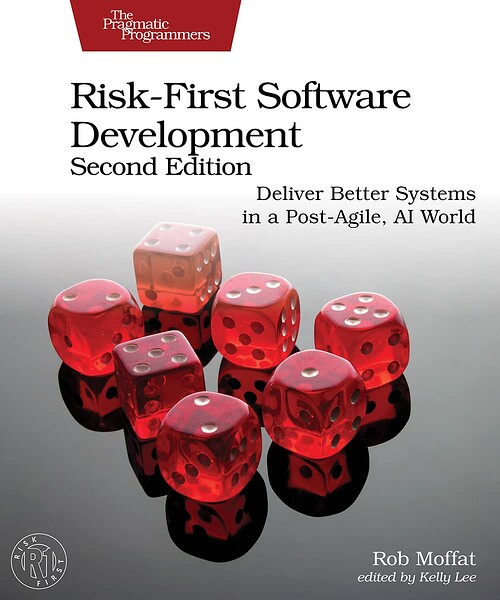Rob Moffat @robmoffat
edited by Kelly Lee @k.lee
Not all software projects go according to plan: many fail due to overlooked problems, misaligned stakeholders, or rigid methodologies. This book offers a groundbreaking framework for thinking differently by identifying risk at the center of every decision. You’ll gain the vocabulary, tools, and confidence to identify, evaluate, and mitigate risks before they derail your project. Whether you’re managing a startup product, steering an enterprise system, or trying to incorporate new technologies such as AI, risk-first helps you get your team aligned, spot trouble before it hits, and build software that delivers.
Software development is awash with methodologies that focus on optimizing process. But process alone doesn’t guarantee success. Projects still miss deadlines, burn out teams, and fail to deliver value. Why? Because most methodologies ignore the underlying force that shapes every decision in a project: risk.
Risk-first software development takes a different approach. It reframes the entire software development process around identifying and managing risk. Through real-world examples and hands-on techniques, you’ll explore not only how risk underscores every software development activity, but how you can turn that to your advantage. You’ll identify and visualize risks with the help of risk diagrams, master techniques such as de-risking, bets, discounting, and risk classification, and build a deep vocabulary for identifying and discussing risks with developers, users, or executives. This shift in perspective will enable you to make smarter decisions, anticipate problems, and adapt confidently to changes, whether to requirements or to new innovations like AI.
Whether you’re a developer, team lead, or CTO, and irrespective of your tech stack or process preference, this book furnishes you with new tools to guide projects to better outcomes. Don’t let risk control you—make it your competitive edge.
Rob Moffat is a software developer with deep experience in the finance industry leading regulatory, risk, and transformation IT projects at top-tier investment banks in London. A strong advocate for open source, he currently serves as the chief architect for FINOS, the Financial Open Source initiative of the Linux Foundation. Rob holds a degree in Computer Science and an MBA.
- Full details: Risk-First Software Development, Second Edition
- View this book’s portal and details on how to post errata and suggestions here
Don’t forget you can get 35% off with your Devtalk discount! Just use the coupon code “devtalk.com" at checkout ![]()

